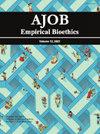Investigating Medical Students' Navigation of Ethical Dilemmas: Understanding the Breakdown and How to Solve It.
Q1 Arts and Humanities
AJOB Empirical Bioethics
Pub Date : 2023-01-01
Epub Date: 2023-06-21
DOI:10.1080/23294515.2023.2224589
引用次数: 0
Abstract
Abstract Purpose Medical students receive a varying amount of training in medical ethics and are expected to navigate clinical ethical dilemmas innately. There is little literature on attempts to navigate ethical dilemmas experienced during early clinical experiences and whether current curricula prepare students for these dilemmas. This study explores the different ethical dilemmas experienced by medical students on their third-year clerkships and analyzes the factors, sources, and resolutions proposed by them. Methods From 2016 to 2018, third-year medical students completed a written assignment to describe, analyze, and reflect on a clinical situation in which they experienced an ethical dilemma. They identified specific ethical dilemmas present, potential preventative and aftermath solutions, and reflected on their professional development from their experience. The research team utilized applied thematic analysis to identify themes and patterns in the data. A thematic matrix was utilized to examine similarities and differences across medical students. Results Of the 162 reflections, 144 (88.9%) students indicated an ethical dilemma that included issues related to autonomy and beneficence. Of these, 116 (71.6%) students found the two ethical principles in direct conflict. Students identified three common sources of this conflict: lack of communication; unclear understanding of clinical policies regarding family authority and psychiatric capacity; and medical negligence. Lastly, students suggested different solutions for dealing with and preventing this conflict. Conclusion Our findings suggest that an overwhelming number of students face ethical challenges when confronted with medical situations that raise conflicts between autonomy and beneficence. Their recommended solutions reveal an appeal among students to have tools and strategies in place to ease the need to make difficult decisions. Medical students might be better served by learning about the complexities of ethical decision-making and the likelihood of experiencing moral distress when they feel an inability to implement what they envision as the best solution.医学生道德困境导航调查:理解其症结及其解决方法。
目的:医学生接受了不同程度的医学伦理培训,并有望天生应对临床伦理困境。关于如何应对早期临床经历中遇到的道德困境,以及目前的课程是否为学生应对这些困境做好了准备,文献很少。本研究探讨了医学生在三年级实习期间所经历的不同道德困境,并分析了他们提出的因素、来源和解决方案。方法:从2016年到2018年,医学三年级的学生完成了一份书面作业,描述、分析和反思他们经历道德困境的临床情况。他们确定了目前存在的具体道德困境、潜在的预防和善后解决方案,并根据自己的经验反思了自己的职业发展。研究小组利用应用主题分析来确定数据中的主题和模式。利用专题矩阵来检验医学生之间的相似性和差异性。结果:在162次反思中,144名(88.9%)学生表示存在道德困境,其中包括与自主和慈善有关的问题。其中,116名(71.6%)学生发现这两项伦理原则存在直接冲突。学生们发现了这种冲突的三个共同来源:缺乏沟通;对有关家庭权威和精神能力的临床政策理解不清;以及医疗疏忽。最后,学生们提出了处理和预防这场冲突的不同解决方案。结论:我们的研究结果表明,绝大多数学生在面对引发自主性和慈善性冲突的医疗情况时,都面临着道德挑战。他们推荐的解决方案表明,学生们呼吁制定工具和策略,以缓解做出艰难决定的需要。医学生可能会更好地了解道德决策的复杂性,以及当他们觉得无法实施他们设想的最佳解决方案时,可能会经历道德困境。
本文章由计算机程序翻译,如有差异,请以英文原文为准。
求助全文
约1分钟内获得全文
求助全文

 求助内容:
求助内容: 应助结果提醒方式:
应助结果提醒方式:


